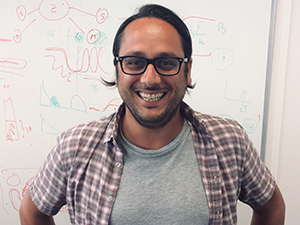Professor Peter Garland CBE, who served as Chief Executive of the ICR from 1989 to 1999, passed away on 5 March.
Before becoming the ICR's Chief Executive, Professor Garland was the founding Head of the Biochemistry Department at the University of Dundee, Principal Scientist at Unilever Research, and Director of Research at Amersham International plc.
A lasting legacy at the ICR
Alongside his scientific achievements, Professor Garland has left a lasting legacy at the ICR. Under his leadership the ICR first received funding from the Higher Education Funding Council for England (HEFCE). This crucial funding from the Government continues to this day from an equivalent body called Research England. Under his leadership, the ICR was also able to increase staff numbers by around 40 per cent and he led the extension of the ICR's Chester Beatty Laboratories (CBL) in Chelsea and the expansion of the ICR's presence on the Sutton campus, which commenced in 1999.
Professor Garland's policy of innovative recruitment saw him bring on board Professor Laurence Pearl and Professor David Barford to jointly head the newly formed Division of Structural Biology, housed in the renovated CBL. This also incorporated the Biomolecular Structure Unit. Peter also appointed Professor Paul Workman, Harrap Professor of Pharmacology and Therapeutics, to lead drug discovery at the ICR. This resulted in the discovery of multiple personalised medicines. Professor Workman, following in Professor Garland's footsteps, later became Chief Executive of the ICR.
Professor Garland also supported Professor Sir Mike Stratton (now at the Wellcome Sanger Institute and a former Director of that institution) in his work in cancer gene discovery. In 1994, this resulted in funding from the ICR to set up a Cancer Gene Cloning Laboratory led by Professor Sir Mike and Professor Colin Cooper and enabled the discovery of the BRCA2 tumour susceptibility gene.
Extremely supportive and extraordinarily influential
He also played an important role as the Chair of Cambridge Antibody Technology (CAT) for many years. One of the UK's most important biotechnology companies, CAT developed the drug Humira that has had a major impact on the treatment of rheumatoid arthritis and Crohn's disease.
Professor Garland was recognised in the 1999 Queen's Birthday Honours with a Commander of the British Empire (CBE) for his services to cancer research and biotechnology.
Speaking about Professor Garland, Professor Paul Workman said:
"Like myself, Peter was trained in biochemistry and had spent some time in industry. I'm hugely grateful that Peter recruited me to the ICR in 1997 from Zeneca Pharmaceuticals to take over the then relatively small drug discovery group at Sutton. He was extremely supportive of my efforts to modernise and build up what is now the Centre for Cancer Drug Discovery and to switch the focus to precision medicines. He also encouraged the productive interaction between my cancer therapeutics centre and Chris Marshall's centre for cell and molecular biology."
Professor David Barford added:
"I'm grateful to Peter for recruiting me and Laurence Pearl to establish a new Section of Structural Biology at the refurbished Chester Beatty Laboratories. The generous support provided allowed us to take on challenging research projects and to collaborate on drug discovery projects with Paul Workman, Chris Marshall and Richard Marais and others. Peter's scientific vision and bold and persuasive recruitment style resulted in far-reaching scientific and medical advances, and positively influenced the careers of many. It is also thanks to Peter's vision as the first Professor of Biochemistry at Dundee University (and Head of Department) in recruiting Philip and Tricia Cohen, that I spent an earlier period of my scientific career in their labs."
Professor Sir Mike Stratton said:
"Peter Garland was an extraordinarily influential Chief Executive of The Institute of Cancer Research. With remarkable shrewdness, foresight, wisdom and determination he reshaped the Institute’s scientific portfolio, setting it on a path of success for decades to come. He was universally respected, and extremely important to me personally in his support and encouragement. I owe him a huge debt of gratitude and will never forget his quiet, but indomitable spirit and vision."
.tmb-propic-md.jpg?Culture=en&sfvrsn=c25d2b2f_9)
 .
.
